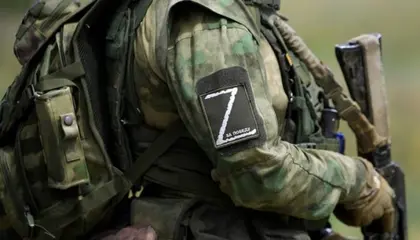Videos of horrific abuses blamed on Russia's troops in Ukraine have exposed what activists say is a deep-rooted sense of impunity in Moscow's army.
A video apparently showing a Ukrainian prisoner of war's beheading by a Russian-speaking attacker sparked fresh outrage last week in the West and prompted comparisons to the Islamic State group's recordings.
JOIN US ON TELEGRAM
Follow our coverage of the war on the @Kyivpost_official.
Russian prosecutors have said they are looking into the video's authenticity, a rare move for Moscow, which is usually swift to deny allegations of war crimes by its troops in Ukraine.
Previous recordings -- showing a castration, the point-blank shooting of a prisoner and the mutilated bodies of dead soldiers -- have been circulating online since Russia's full invasion began last year.
Not all have been verified and many perpetrators of the acts remain unidentified, but Ukrainian officials have repeatedly put the blame on Russian forces.
- Chechnya, Syria, Ukraine -
"We don't know when and where this (decapitation) video was recorded, it's impossible for now to say who the perpetrators are, but there is a context," said Alexander Cherkasov, director of the human rights centre at Russian group Memorial, whose closure was ordered by Moscow in December 2021.
"There have been precedents, especially in Chechnya where dozens of headless bodies were discovered, among the thousands of forced disappearances during the second Chechen war" from 1999-2009, he added.

EXPLAINED: What We Know About Russia’s Oreshnik Missile Fired on Ukraine
He also pointed to a 2017 video from Syria showing the torture and killing of a deserter from Damascus's army, which sparked the first criminal complaint against Russian mercenary group Wagner.
That case -- filed in Moscow in 2021 by three NGOs, including Memorial -- said they had identified the perpetrators as Wagner fighters.
Russian courts closed the case, which is now with the European Court of Human Rights.
"There's an impunity mechanism that's been at work since the first Chechen war (in 1994-96), and what we're seeing in Ukraine today results from that," Cherkasov said.
"Russian leaders, whether they're in the army, the intelligence services or Wagner, go unpunished and can be sure of that impunity".
Cherkasov co-authored a recent report from Memorial laying out that the Chechen, Syrian and Ukrainian conflicts "sometimes involved the same actors, the same units and military outfits".
It was "a chain of wars, a chain of crimes, a chain of impunity," the group added.
- 'Green light' -
"Because there was no reaction from the international community about what happened in Syria, we have this situation in Ukraine," says Syrian lawyer Mazen Darwish, founder of the Syrian Centre for Media and Freedom of Expression.
His group was one of those to file the Russian court case against Wagner.
"By rejecting it, (the Russian justice system) gave a green light to these soldiers, who feel protected, they know they won't be held accountable," Darwish said.
Anna Colin Lebedev, a researcher specializing in post-Soviet societies, warned against explanations blaming inherent characteristics -- noting that most of the shock videos have been attributed to Wagner, not the regular Russian army.
"There's a whole bundle of things that make this violence possible," Lebedev said, pointing to "practices seen as acceptable, like making no distinction between civilians and combatants".
She further highlighted "a problem with leadership and hierarchy in the Russian army, a lack of clarity about the war's objectives and the social profile of the soldiers at the front" -- many of them from impoverished, poorly educated backgrounds.
Wagner has also infamously recruited tens of thousands of convicts from Russian jails to swell its ranks in Ukraine.
Such people may be criminals, but are also "psychologically broken" and accustomed to intense violence from years in Russian prisons, where torture, rape and solitary confinement are widespread, Russian lawyer Yana Gelmel noted at a recent Memorial conference in Paris.
You can also highlight the text and press Ctrl + Enter






